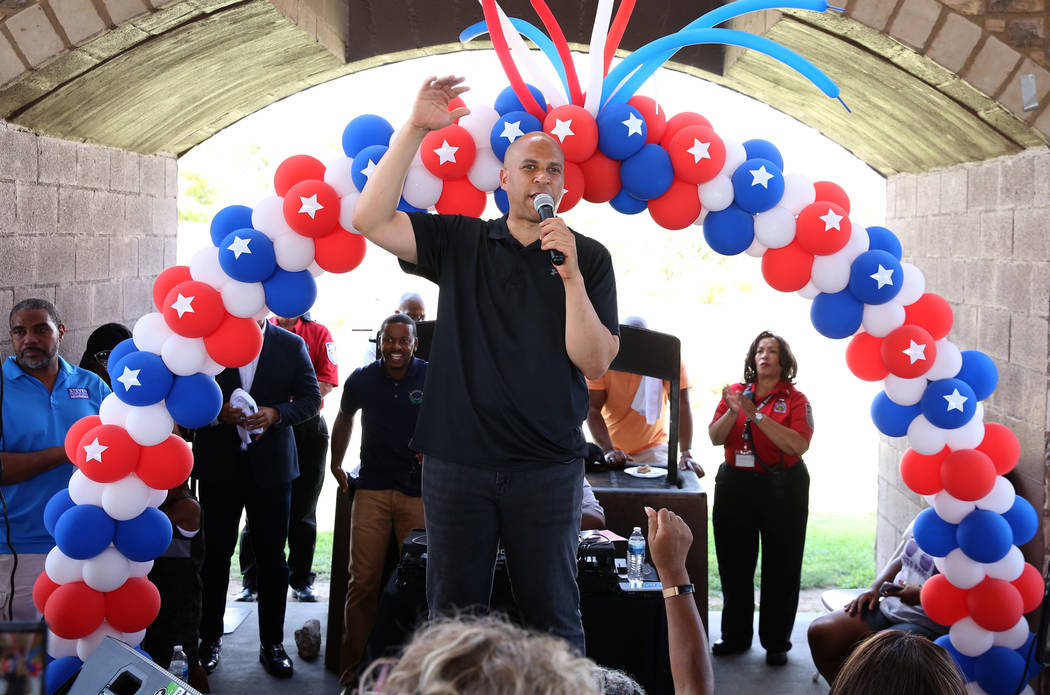Cory Booker on guns, affordable housing and wages

If you ask New Jersey senator and 2020 presidential hopeful Cory Booker about gun violence, his inner-city neighborhood in Newark tends to come up.
“In urban communities like mine, we see such horrific levels of violence,” Booker said during a Labor Day stop in Las Vegas. “In this nation we tolerate such — I mean the strongest nation on the planet Earth, and we’re sending kids back to school this fall and we’re telling them ‘we can’t protect you, so we’re going to teach you in school how to hide … how to shelter in place because we can’t protect you.’
“It’s unacceptable,” he added.
As mass shootings pepper the nation week after week, Booker’s stance on gun violence — often self-promoted as the toughest among the crowded 2020 field — is perhaps his signature issue, though he was happy to discuss labor, education, housing and more in an interview with the Review-Journal.
Booker’s plan has everything the field is talking about — universal background checks, assault weapon bans, red flag laws, the return of federal funding for gun violence research. But it adds a licensing requirement similar to that required of a car, as well as investment into neighborhoods like his.
And the movement gaining steam among 2020 Democrats to require assault weapon owners to sell their guns to the government? Booker has been calling for that for months.
“This is the thing that infuriates me — that the gun lobby tries to make these things sound complicated,” Booker said of a buyback program.
He said the U.S. government enacted a similar ban on machine guns in the 1980s to great effect.
Affordable housing
What to do about guns is a common question for Booker and his fellow candidates, but he delights in tackling a wide variety of subjects. And he wishes more people would ask him about affordable housing.
“I’ve been in multiple debates now, and not one question (on affordable housing),” Booker said. “But yet it’s the pain point for so many Americans.”
His first plan is to extend the mortgage interest tax deduction to renters who pay more than one-third of their income in monthly rent. He said this will immediately move 10 million people above the poverty line in America, with tens of thousands of those Nevadans.
Booker wants to rewrite “exclusionary zoning laws” that have made it difficult to build affordable housing, and he wants to encourage building specialty housing for veterans and those with mental illness who may be living without permanent housing.
The former tenants’ rights lawyer would also like to see people facing eviction provided with free legal representation similar to criminal cases, which he said would cut evictions “dramatically.”
‘The future of work’
Booker spent Labor Day morning with the local Service Employees International Union talking to Las Vegas McDonald’s restaurant employees about their right to organize and the need for a $15 minimum wage.
“I wanted to do what I could to join with labor activists and do some things that would actually advance the larger issue at stake here, which is making sure that every American who works a full-time job has a living wage, has security and health care and retirement, and can give their family their American Dream,” Booker said.
When asked about the common criticism of paying fast-food workers $15 an hour — that they’ll be replaced with robots — Booker said that automation is coming regardless of the Fight for 15.
“That’s the wrong argument,” Booker said. “That’s a reason why we should suppress wages and give people lives of utter insecurity, where they’re working 50, 60, 70 hours-a-week and still not able to afford rent?”
Booker pondered why the United States’ economic competitor nations in Europe and South Korea treat workers so much better, with living wages and stronger benefits.
“I don’t understand why we have to have such an oppressive environment where workers — where 40 percent of Americans can’t even take a $400 hit to their monthly lives,” Booker said.
Adjustment for technological advances is important, Booker said, but the robots-replacing-minimum-wage-workers argument doesn’t necessarily hold up. He noted that ATMs did not lead to the end of bank tellers, for example.
He said preparing for “the future of work” involves investing in trade schools, in addition to making college more affordable.
College debt
When asked if he favored free college tuition and student loan forgiveness, Booker acknowledged that many millennials face crippling debt associated with their education.
He favors “debt-free college” and loan forgiveness for certain professions in the public service realm — teachers, school psychologists, public defenders.
As a senator, Booker is also pushing legislation for government-issued “baby bonds,” or savings accounts given to newborns. The government would place up to $2,000, depending on family income level, in these interest-accruing accounts per year. Children of low-income homes would have nearly $50,000 to their name upon reaching the age of 18, which Booker said could be used to pay for higher education or training.
Teacher pay
Booker’s return to Las Vegas came only days after the nation’s fifth-largest school district reached a tentative agreement with the local teachers union to avoid a strike in Clark County.
The senator said that teacher pay must be increased across the board on a federal level.
In addition to college debt forgiveness, Booker said he hopes to close tax code loopholes that allow hedge fund investors to pay less in taxes than educators.
Contact Rory Appleton at RAppleton@reviewjournal.com or 702-383-0276. Follow @RoryDoesPhonics on Twitter.